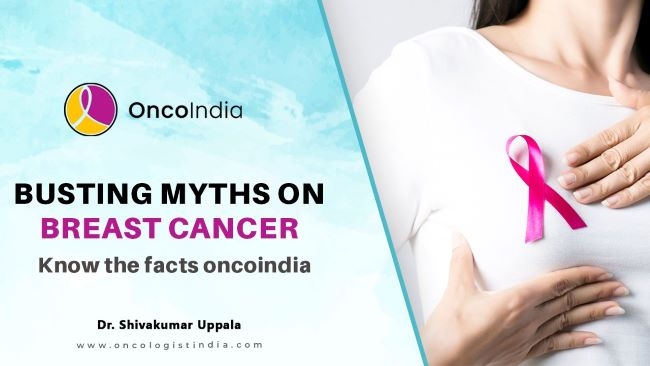Breast cancer is beyond a medical condition, it has become a topic that has been spreading awareness every day, a chapter that resonates well with individuals, families, and communities. This excruciating battle has touched hearts, spread awareness, and empowered people to take good control of their health.

In a world that is filled with so much information, it's very easy to fall victim to misconceptions about a condition like breast cancer. We shall unravel the truths behind some common myths surrounding breast cancer, empowering you with accurate knowledge and awareness.
If someone hasn't faced the condition personally or nearly got to the border, they might struggle to distinguish between myths and facts about the disease. Who is at risk and why, or what the treatment entails may not be quite clear to them. So it’s important to erase some myths and be clear on the facts. Here are some of the following myths that definitely need a burst.
Myth 1: I don’t have a family history of breast cancer, so I won’t get it.
Fact: Often people assume that breast cancer is hereditary. That is not the case. Only 5–10% is linked to genetic mutations passed from parent to child. Most individuals with breast cancer show no family history, and it has more to do with factors like environment and lifestyle that plays a significant role which gives rise to the condition.
Myth 2: If you eat healthy, exercise regularly and limit alcohol you don’t have to worry about breast cancer.
Fact: To a certain extent this is true, but it does not always apply. Women who are diagnosed with breast cancer often state that they eat healthy or don’t consume alcohol and certain evidence does highlight that these lifestyle patterns can lower the risk of breast cancer. However, this does not confirm that you would not develop the condition. Along with the factors you can control, like lifestyle it is also important to get regular screenings, perform breast self-exams and pay heed to unusual changes in the breast.
Myth 3: All Lumps in the Breast are Cancerous
Fact: Regular self-breast examinations help identify lumps or swelling in the breast. Though many lumps are non-cancerous, it's important to report any painless lump discovered after the age of 40 to your family physician or gynecologist.
Myth 4: Chemotherapy is Essential for all Breast Cancer patients
The treatment for Breast Cancer varies based on its type. If the patient has high Estrogen and Progesterone receptors, oral hormonal therapy may be recommended. Genetic tests can further help determine whether hormonal therapy or chemotherapy would be more beneficial, and your Oncologist will provide guidance on this.
Myth5 : Using underarm antiperspirant can cause breast cancer.
Fact: Despite many rumors, there is no evidence supporting a connection between using underarm antiperspirants, including those with aluminum and other chemicals, and an increased risk of breast cancer. However, certain studies have noted higher concentrations of aluminum in the breast tissue of women who use aluminum-based products under their arms.
Importance of taking Chemotherapy and Radiation as Advised by the Doctor
Often patients hesitate to take treatments like Chemotherapy because they feel they would fall sick forever or have the fear of losing their hair, the latter being the most talked about reasons. Dr Shiva Kumar from Trust in Hospital, one of leading hospitals in Bangalore speaks about the crucial role of Chemotherapy and radiation therapy in Breast Cancer. Chemotherapy and radiation therapy are commonly used in the treatment of breast cancer because they have proven to be effective in destroying cancer cells and preventing their growth. I recall an incident involving a 50-year-old patient in the early stages of breast cancer. Initially hesitant about treatment due to concerns about hair loss, she opted not to undergo chemotherapy. Unfortunately, the situation worsened as the cancer relapsed. When she finally sought treatment at our hospital, it had progressed to the fourth stage. It was then that she recognized the importance of chemotherapy, and she is currently undergoing treatment at our facility.
Fatigue is a common side effect and patients are bound to go through that phase, but though slow people will eventually get right back up. The treatment often includes chemotherapy along with other methods like surgery, radiation, or hormone therapy. In radiation therapy, high-energy X-rays or particles are used to eliminate cancer cells. Cancer cells, which grow quickly, are more sensitive to radiation therapy compared to normal cells. Chemotherapy is one of the most effective treatments that can reach cancer cells throughout the body, including those that may have spread.This is important in treating cancers that are more aggressive or have a higher risk of spreading. And do you know? Chemotherapy and radiation are often used as adjuvant therapies, meaning they are given after surgery to eliminate any remaining cancer cells and reduce the risk of recurrence. Adjuvant therapy aims to improve long-term outcomes and increase the chances of a cure.
Blog Reviewed By: Dr. Shiva Kumar Uppala